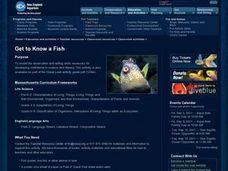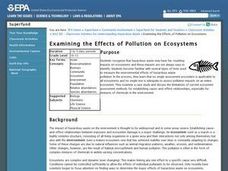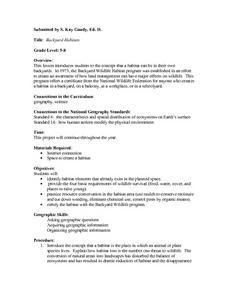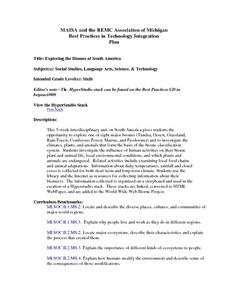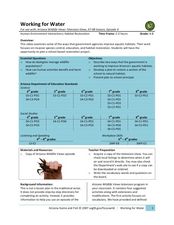Curated OER
Literacy Lesson: Guided Reading
Here is a wonderful lesson plan designed for students with special needs. This well-thought-out lesson plan uses Big Books, familiar stories, and has a lot of review learning built into it. The book, The Keeping Quilt is used in the main...
Curated OER
Personal Narrative Paragraphs: Class Quilt
Begin this activity by asking third graders to bring from home pieces of cloth that represent something important to them. (Have extras for young scholars who need them.) They reflect on important events in their lives, compose narrative...
Curated OER
How to Write an Essay: Secondary ed.
Whether introducing the structure of expository essays or reviewing the format with your high schoolers, take the time to check out this resource. Examples of seven common forms of introductory paragraphs and six types of conclusions, as...
Curated OER
Ecology
In this ecology worksheet, students read information about ecology and the nine ecology subdivisions and answer comprehension questions. Students answer ten questions in this matching and fill in the blank worksheet.
Curated OER
Would You Like A Desert With That?
Students explore the four different deserts in the United States and their characteristics. They discuss the four different types of deserts in United States and their characteristics, and locate them on a map.
Curated OER
Get to Know a Fish
Students discover the anatomy of a fish by identifying its body parts. In this oceanography lesson plan, students view a live fish in their classroom and draw a poster of the fish one body part at a time while identifying it....
Curated OER
Mammal Morphology - Bats, People, and Other
In this physical characteristics worksheet, students compare bats and humans by putting a + sign in the chart for whether or not bats and humans have the same characteristics. Students do this for 17 characteristics and answer 3 questions.
Curated OER
Examining the Effects of Pollution on Ecosystems
Students examine the different types of tests used to measure the environmental effects of hazardous waste. They work together to determine the impact of pollution on different ecosystems. They read a case study and answer questions to...
Curated OER
Backyard Habitats
Students identify habitat elements. They create a habitat in a backyard, on a balcony, at a workplace, or in a schoolyard and provide the four basic requirements of wildlife survival (food, water, cover, and places to raise young). They...
Curated OER
Ecology
In this ecology instructional activity students complete a crossword puzzle that incorporates all of the ecological vocabulary in the word puzzle.
Curated OER
Needs of Living Things
Students discuss and explore the needs of living things. They choose to create a slide show with captions, create a web showing the needs of one Organism using KidPix. or make picture book by hand or using Microsoft Publisher.
Curated OER
Alice Computer Programming
Students explore multimedia components. In this science inquiry lesson plan, students read "Invitation to the Game" by Monica Hughes and they use the Alice Computer Programming System to better understand population dynamics.
Curated OER
Ecosystem Organization - Lesson Plan
Student explore ecosystems. In this ecosystem organization lesson, students consider how scientists study living organisms. Students participate in a teacher guided activity that requires them to visualize an organism and imagine its...
Curated OER
Hunting Invertebrate Fossils in the Classroom
Students acquire a general knowledge of fossils and paleontology, the study of evidence of life in the past and identify the major invertebrate groups (phyla) commonly found in the fossil record.
Curated OER
T's Alive! Or Is It?
Learners explore data on the bone, muscle, and skin of living systems and then create a list of characteristics of these systems and relate these characteristics to bone, muscle, and skin.
Curated OER
Exploring the Biomes of South America
Sixth graders complete a five-week unit investigating the eight major biomes of South America. They conduct Internet research, collect short-term and long-term climate data, and create a HyperStudio slideshow stack about a selected biome...
Curated OER
Who Eats Whom in the Salt Marsh?
Seventh graders complete a virtual online salt marsh tour. In groups, they observe and identify the various types of animals found in the marsh. After categorizing the animals, they create a food web based on the animals role in the...
Curated OER
Giraffe Riff Raff
Students study the effects of wildlife conservation and relocation. In this conservation lesson students view video on the preservation of the giraffe populations and discuss the impact that humans have had on them.
Curated OER
Savanna Hands-On Biome Building
Fifth graders participate in an interdisciplinary project related to the Savanna biome. In this biome building lesson plan, 5th graders display the elements of the Savanna biome such as the geography, animals and plants, and...
Curated OER
The Birds and the Bees, and the Flowers and the Trees
Learners examine the roles in which animals play in the pollination of plants. They recognize that flowers have male and female sexes. Students describe cross pollination and propose reasons for cross pollination through narration of a...
Curated OER
Working for Water
Learners examine the ways that government works to help improve aquatic habitats. In this water habitats instructional activity students view a video and plan a school restoration project.
Curated OER
Creature Features
Students examine why certain animals live in only specific places throughout the world. Using animals, they classify them based on their characteristics and identify their basic needs. They also observe and compare the life cycles of...
Curated OER
Mammal Morphology: bats and people
In this mammals worksheet, students compare and contrast the physical characteristics of bats and people by filling out a chart. Students complete 17 rows in the chart and answer 3 short answer questions.
Curated OER
Food Web Relationships
In this food web worksheet, learners create a food web matrix and answer short answer questions about the food chain according to the matrix. Students complete 7 short answer questions.





